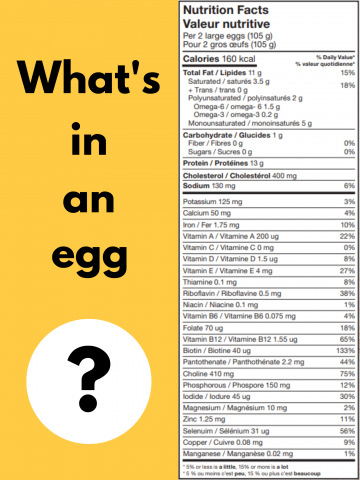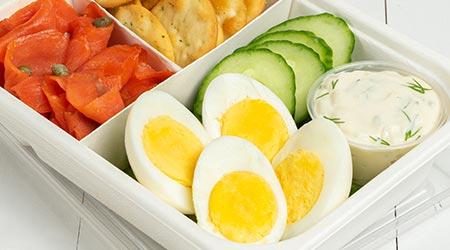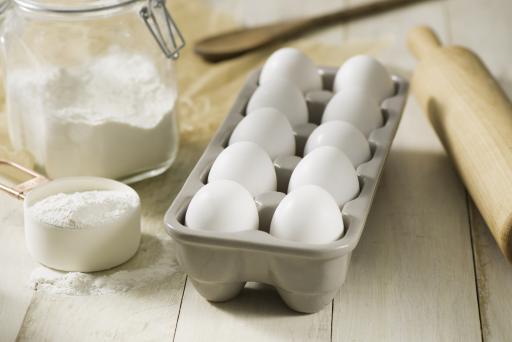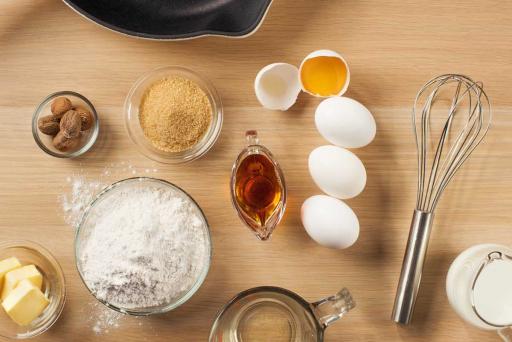"How Much Sodium in an Egg?"

Our Answer:
August 13, 2018
Hi Roni,
One large or extra-large egg naturally contains 65 mg of sodium.
Hard-cooking an egg would not affect the sodium content, even adding salt to the water during hard-cooking won’t significantly impact its sodium level.
FAQ
What part of the egg has the most sodium?
Egg whites contain most of the sodium in an egg. On average, a large egg white contains around 55 milligrams of sodium, while a large egg yolk contains approximately 8-10 milligrams of sodium. Keep in mind that these values can vary slightly based on the size of the egg and other factors. If you're looking to reduce your sodium intake, you might consider consuming eggs in moderation or paying attention to how you prepare your eggs to limit how much sodium is added to your egg dish.
How many boiled eggs should I eat a day to avoid high sodium levels?
According to Mount Sinai Hospital, Canadians should consume between 1,200 - 1,500 milligrams of sodium each day. This range may vary from person to person depending on their age, activity level and overall health.
If you're looking to avoid high sodium levels while consuming boiled eggs, here are some considerations:
- A large boiled egg typically contains around 65 mg of sodium, with most of it found in the egg white. This means that if you were to eat two boiled eggs, you would consume approximately 130 mg of sodium from the eggs themselves.
- To stay within the recommended daily sodium intake, you'll need to consider the sodium content of other foods you consume throughout the day. Many processed and packaged foods can be high in sodium, so it's important to read nutrition labels and make mindful choices.
- It's important to remember that a healthy diet is about balance. While eggs are a nutritious source of protein, vitamins, and minerals, they should be part of a varied diet that includes a range of nutrient-rich foods.
How much sodium is too much?
The amount of sodium that is considered too much varies from person to person and is dependent on several factors like age, activity level, overall health and more. Generally speaking, the ideal daily sodium consumption is between 1,200 and 1,500 mg. Most Canadian diets consume almost double the recommended sodium amount each day, which may result in long-term health problems:
- High Blood Pressure: High sodium intake is often associated with elevated blood pressure, which is a major risk factor for heart disease, stroke, and kidney disease. A daily diet high in sodium and saturated fats can result in increased risk of high blood pressure.
- Cardiovascular Issues: Consuming too much sodium can contribute to the development of cardiovascular diseases, including heart disease and stroke.
- Kidney Problems: High sodium intake can strain the kidneys, potentially leading to kidney dysfunction over time.
- Fluid Retention: Excess sodium can cause the body to retain water, leading to bloating and edema (swelling).
- Osteoporosis: Some studies suggest that high sodium intake might contribute to bone loss and osteoporosis, although more research is needed to fully understand this relationship.
- Stomach Cancer: Diets high in sodium, particularly from salty and preserved foods, have been associated with an increased risk of stomach cancer in certain populations.
As a result, it's important to be aware of the sodium content in the foods you eat and to make mindful choices to avoid excessive sodium intake. This includes limiting the consumption of highly processed foods, fast foods, canned soups, packaged snacks, and other foods that tend to be high in sodium. Also consider how you are preparing your foods and avoid adding additional, unneeded sodium during the cooking process.
Are hard boiled eggs high in sodium?
One boiled egg has about 65 mg of sodium, which accounts for 4-5% of most people’s recommended daily sodium intake. As a result, hard-boiled eggs are not considered high in sodium when prepared and eaten plain. If you are watching your sodium intake, avoid adding things like salt and savoury condiments to your eggs, which may add sodium to your diet.
How much sodium is in a plain hard-boiled egg?
One large or extra-large egg naturally contains 65 mg of sodium. Hard-cooking/hard-boiling an egg would not affect the sodium content, even adding salt to the water during hard-cooking won’t significantly impact its sodium level.
Does the sodium level increase when you cook the egg?
No, the sodium content of an egg does not increase when you cook it. The sodium content of an egg remains the same whether it's raw, cooked, boiled, fried, or scrambled. Cooking methods might affect the overall weight of the egg due to water loss, but the sodium content itself remains constant. However, adding additional ingredients like salty seasonings will increase the total amount of sodium in the egg dish so it is important to be cautious of how you prepare your eggs if you are looking to limit your daily sodium intake.
Related Questions
Can I safely pasteurize eggs using a sous vide machine for pregnancy?
Can you sell fertilized eggs for Food consumption?
Do I have to wash my eggs to sell them from my farm?
What would cause my current eggs to have the yolk at the bottom (opposite the pointed end)?
Are eggs pasteurized for sale to the public
How Much Sodium in an Egg?

















